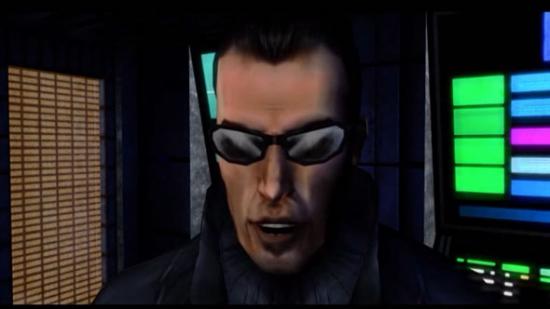After a couple of hours of sneaking, hacking, and the occasional outburst of mechanically crude gunplay that’s made a bit more bearable thanks to my investment in JC Denton’s pistol skills, I finally confront the high-ranking NSF terrorist, Denis Lebedev. I’m about to hand him over to UNATCO for arrest when he begins to drop the narrative bombshells – about JC’s parents, his past, his seemingly benevolent employer’s true intentions. As I listen to him, frosty yet sexy mech agent Anne Navarre runs in and orders me to terminate Lebedev. When I refuse, she unloads her clip into Lebedev. Operating on pure reflex, I unload mine into hers.
Christ, this is bad. What have I done?!? Navarre’s dead, Lebedev’s dead, and I half-expect the game to tell me I fucked up and force a reload. It doesn’t.
This event – seemingly unscripted yet meticulously orchestrated by the developers – is one that many players experienced a variation of when playing Deus Ex at some point in the last 16 years. But I repeated it just the other day, during what was meant to be a quick break from playing 15 or so hours of the latest entry in the series, Mankind Divided. Except now it’s become more than a break. I’m fully immersed in the shabby, broken world of the original Deus Ex (the Revision mod, to be exact, but more on that later), and I’m in no hurry to return to its Prague-based progeny.
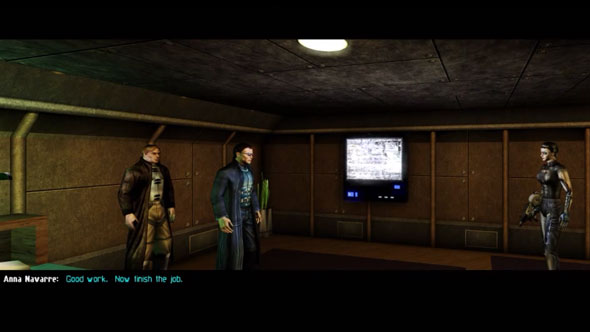
While the Navarre/Lebedev showdown was the point at which Deus Ex really got its tendrils into me, my goodwill towards the game had been growing steadily in the hours leading up to that. Before my return to Deus Ex, I lazily fused its hero JC Denton and Mankind Divided’s Adam Jensen into the same character in my head, seeing the latter as an unofficial continuation of the former – an Adam ‘JC’ Denjenson, if you will. They’re both raspy, monotonous, and mild ripoffs of Neo from The Matrix, but a few dialogue choices into Deus Ex, it became clear that there’s a whole lot more to ol’ JC than I remembered.
The guy’s a bloody joker for one thing – an embodiment of action hero one-liner cheekiness who lightens the tone of a game at just the right moments. In your first confrontation with an NSF terrorist leader, for example, the guy gloats about how a shipment of Ambrosia vaccine is being delivered to the people, “and you can’t do a damn thing about it.” To which Denton can retort: “Except send YOU back to the people – in a body bag.”
.jpg)
No messing around. Soon after that, Navarre gives you her feedback depending on how you performed in the mission (it’ll be backhanded and bitchy either way), to which Denton can say: “You mechs might have copper writing to reroute your fear of pain, but I’ve got nerves of steel.”
.jpg)
Delivered with that characteristically raspy, robotic voice, such dialogue (which is plentiful throughout) imbues JC with a likeable brashness; he’s a bit of a dick, but in an irreverent way befitting of a series that hasn’t yet started to treat its crackpot narratives a little too seriously. Denton exhibits an awareness on the writers’ part that, brilliant though Deus Ex is, it’s also a bit silly.
Jensen, on the other hand, prefaces Mankind Divided with the words, “I once thought I could save the world. Now look at it” – a statement setting us up for the awkwardly written earnestness that pervades throughout. In contrast to the original game (exemplified by the Navarre-Lebedev confrontation), crucial decisions in Mankind Divided feel framed, synthetic, with the music fading into ‘suspenseful’ mode whenever you enter the now familiar persuasion minigame with one person or another. Jensen’s dialogue choices in these scenarios feel so damn sensible and over-elaborate that even his ‘straight talk’ options are polite and periphrastic. Like the one in this picture here…
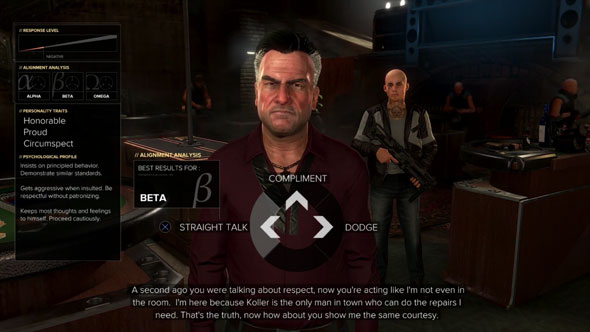
Jesus, Jensen. Don’t be such a softie! Tell him if he doesn’t help you, you’Il piston-fist a hole in his stomach. I don’t know, maybe this is just what straight talk sounds like in 2016 – get offended, pull people up on semantics, poke holes in their logic, then demand courtesy. Now I’m knee-deep in the original DX though, I can’t help but wonder, what would Denton have said in the above situation?
Denton isn’t all one-liners and tough talk. His sillier moments belie a deep and well-rounded narrative that weaves through the characters and environments far more comfortably than MD’s ham-fisted allusions to real-world racial tensions.
With that said, Prague is an excellent city hub (I dedicated an entire article to it – albeit assuming at the time that there would be more than one such hub in Mankind Divided). For the first time in the series, we see a world we can actually recognise in Prague, and the brutal ways in which futuristic architecture and technology have intruded on it looks great. I enjoyed scurrying along its gutters, rummaging through its cluttered apartments and violating its bullshit segregation laws, and can think of few other city hubs that I’ve had such a great time just exploring.

The problem is, the joy of exploration alone can only keep my attention for so long (hands up anyone who remembers No Man’s Sky?), and while I can get immersed in the beautiful sights and sounds of Mankind Divided, I don’t buy into its world. The separate train carriages for augs and normals, the superficial suspicions towards Jensen for being an aug before people realise he’s a badass and stop hassling him, bloody “Augs Lives Matter” and “mechanical apartheid”; these allusions are rendered impotent by their transparency, and the developers’ attempts to make Mankind Divided a hard-hitting political allegory fail because it doesn’t wrap them around a compelling story.
Deus Ex makes no such allusions. Coming from an era when AAA games weren’t even a thing, it wasn’t tied down by some nebulous social obligation to say something topical, leaving it dedicated to delivering a compelling story. Where Mankind Divided is all ‘bigger picture’ – all Illuminati and broadstroke social commentary – DX thrives in its supporting stories.
For example, the mechanically augmented agents Gunther Hermann and Anne Navarre, for all their aloofness, are wonderful characters. I’d come away from each of our bickering sessions feeling a tad melancholy, thinking that it must feel horrible becoming an outdated piece of technology overnight (just imagine how Windows 8 and 8.1 would feel if they were sentient). It’s those two alone in a world that’s moved onto the Next Big Thing in nano-augmentations. They’re isolated, embittered, and care little for whether they live or die, just as long as they die violently. They’re tragic when you delve into them, while at the surface level delivering a great balance of antagonism (Navarre) and comic relief (Gunther). Excellent videogame character-building.
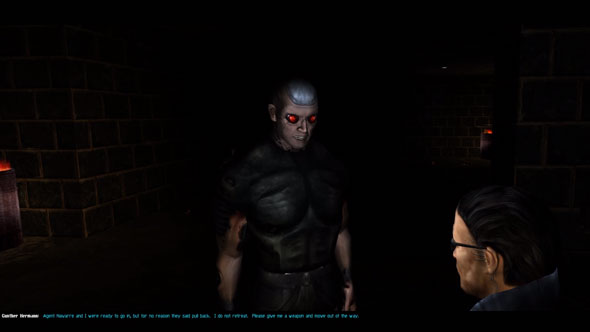
Such characters are ubiquitous throughout Deus Ex. Denton’s sporadic interactions with Manderley hint at a surrogate paternal relationship (which is fitting, given UNATCO killed JC’s parents), while I felt genuinely conflicted about JC’s brother Paul, who I always suspected was abusing his siblinghood for his own causes rather than actually looking out for JC. “Oh, you fought your way through my terrorist pals and now you’ve discovered I’m actually on their side? Hmm, maybe you’re more useful than I thought. Fancy joining us?” Classic dickish Paul. Must run in the Denton family.
Even the hobos’ seemingly inane ramblings reveal snippets of story that you only realise in hindsight; talking about ‘Mole People’, about how the NSF is here to help them while UNATCO are not to be trusted, even these unnamed charaters contribute to building a world that feels unique and running deep with mystery and intrigue. You don’t know who to trust at any point, while in Mankind Divided you’re in no doubt from the off that the Illuminati are bad (because let’s face it, the Illuminati are about as nuanced a villain in pop culture as Hitler or Satan), and that the pretty Panamanian lady with visible augmentations is good.
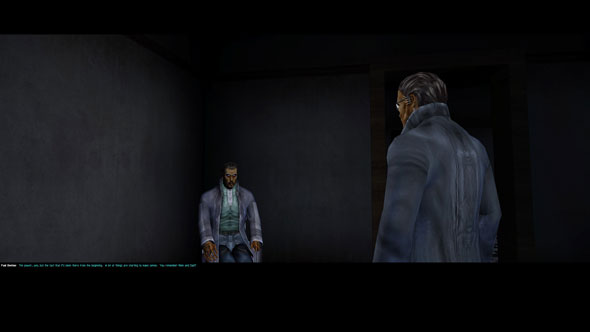
Not that Mankind Divided is without its share of solid characters, it’s just that Jensen is too detached to get to know any of them. Returning from Human Revolution, the technological idealist David Sarif is a personal fave. He’s a believer in the ever-growing fusion between man and machine, and no human cost is too high for Sarif to achieve that dream. He wanted to use the Aug Incident for his own agenda, and always wheedles his way out when Jensen busts him for harbouring one secret or another. Sarif’s conviction is seductive, and I’m genuinely onboard with Jensen in always forgiving the guy.
The bloodshot backstreet aug surgeon Vaclav Koller is equally compelling – how does Jensen know this twitchy genius, and why does he trust him to physically fiddle around in his brain? We don’t really know, because we’re never given enough information to even have a sniff of an idea. Human Revolution’s hacker, Frank Pritchard, is another one, and he’s making a return in the Mankind Divided DLC. It’s hard to get too excited though, as Jensen in his current form seems incapable of developing a meaningful, insightful relationship with anyone So we just end up stuck with Jensen, and that insufferable commander barking orders at you.
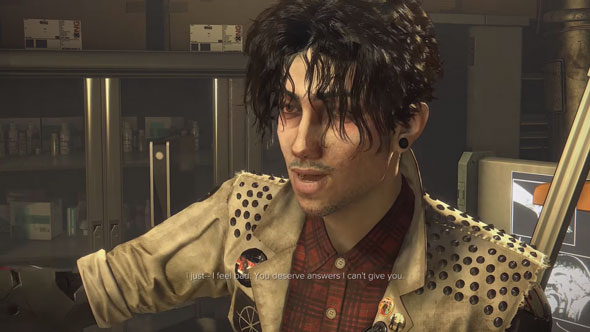
So here I am, revisiting the original Deus Ex and being vividly reminded why it’s one of the all-time greats. At the risk of enraging the purists I’ve been playing using the Revision mod, which is available as a free download on Steam with Square Enix’s blessing. It makes a large number of tweaks to the game – lighting, improved textures, higher contrast, reworked character models, redesigned levels and reworked soundtrack – which, on the whole, bring it up to the fidelity that our nostalgia would have us believe the original game actually held in the first place.
The visuals and redesigns make Revision the quintessential Deus Ex experience. Where before levels tended to feel like vast, largely hollow expanses that were far more acceptable 16 years ago, Revision fleshes them out. Hell’s Kitchen is filled with pushy product posters and neon signs, Hong Kong is a veritable overload of signage and overflowing bins. There are plenty of extra emails and lore bits that incentivise additional vent-crawls, fire-escape-climbs and break-ins, as well as smaller environmental details that embellish world-building; the dead NSF terrorist that Navarre uses as a pincushion in her office is a bit tenuous (doesn’t he start smelling after a while? Or does UNATCO have a store of them hanging on meat hooks in a freezer?), though Manderley’s grand new wood-panelled office is a perfect fit for the old dog.
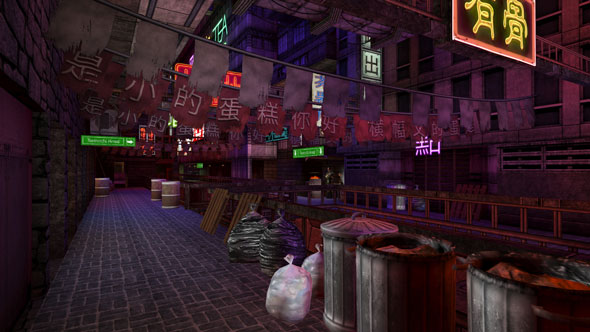
The sharper contrast in Revision makes the darks darker and the red glows from oil drums or neon signs redder, which isn’t to everyone’s tastes. But for a game whose vision of a future now seems pretty retro, the saturated palette gives it a flourish of neo-noir. Everything is a bit more dramatic, a bit more moody, embracing the game’s datedness by stylising it, which has the paradoxical effect of making it feel less dated (sort of like how eating a highly acidic lemon reduces your stomach acid levels).
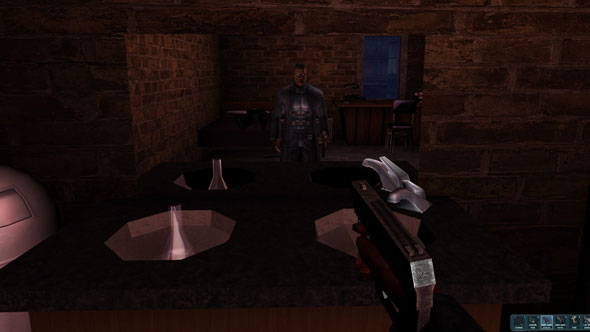
My biggest criticism of Revision is the overhauled soundtrack, which rejigs the original tunes to sound more liquid and ambient. It still sounds nice and immersive, though it lacks the punchiness of the original. Perhaps Caustic Creative thought that Alexander Brandon’s 90s-sounding original would clash with the visual overhauls, which knock a couple of years off the game.
One thing that hasn’t changed is the gameplay. Deus Ex still feels very janky to play. Recoil on every weapon early on makes your crosshair expand out to the four corners of the screen, and gunplay feels stiff and nasty. My trigger finger is spending about as much time on the Quick Save and Quick Load keys as on the actual trigger button, so prone am I to sudden and mechanically dodgy deaths.
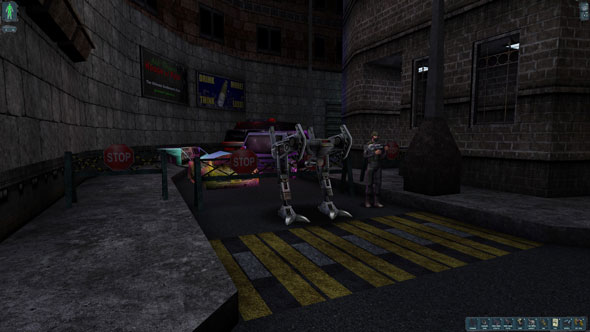
But it’s not for mechanical reasons that I got lured back to the original. Mankind Divided does all that stuff very well indeed, and Jensen’s arsenal of augmented superpowers (that he still whines about) kept me playing around Prague for a good many hours. It’s only when Prague began to feel familiar, and I prepared to carry on with the story that I think I was about 40% of the way through, that I decided to pick up the original, which put into perspective MD’s shortcomings.
I will go back to Mankind Divided. For all its self-seriousness and lack of progress on its predecessor, it’s a fun game. But Deus Ex is a masterpiece, and even after all these years can still teach a thing or two to modern games about how to tell a story in a videogame.
